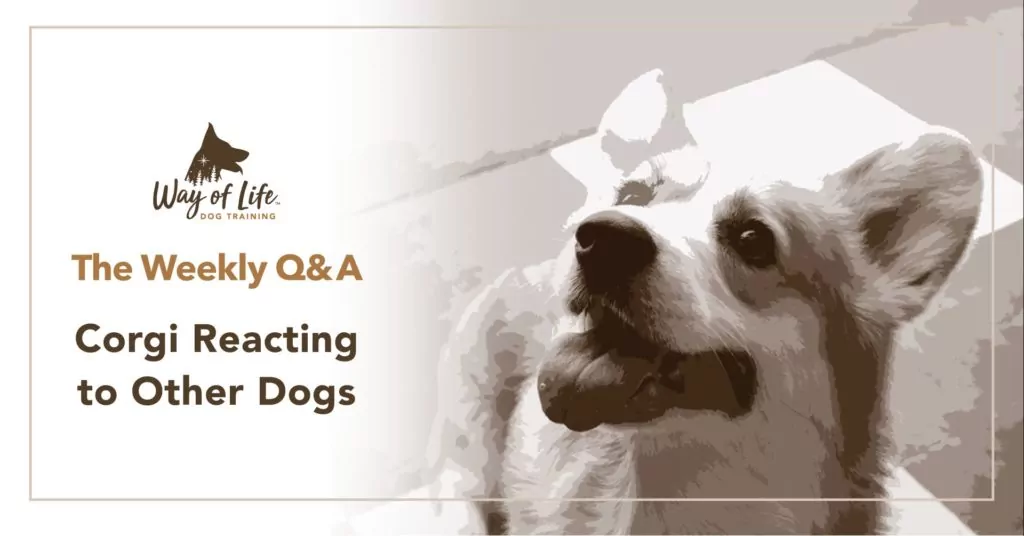
Q: We have a two-year old Corgi named Lola. We’ve had her since she was 8 weeks old and she is a very sweet girl. We took her to a couple of group training classes when she was a puppy, and for the rest of her years I personally trained her. From 6 months old she went to daycares a lot, and the caretakers always said she’s very good with other dogs and plays hard with them. Last year, we still took Lola to daycares at least twice a week up until November.
About a month ago, we decided to take her to dog parks more often on the weekends because we felt like she was only getting walks and play at home during the week. That is when her dog-on-dog aggression started to show up. She would snarl and try to bite any dog who approached her. Even if these other dogs that came over are very gentle and calm, Lola would still snap at them. We would pull her away and calm her down then try again, but she would still snap at others. But there are also instances where she played fine with other dogs, chasing them around the field. The behavior also started showing up during her walks when she would see other dogs. Even after calming her down, she would just suddenly snap at another dog that was just greeting her. We are worried about this behavior and want to ask if there is anything wrong with her sudden change.
A: The simple answer to your question is that the methods that you’re using to supposedly “socialize” Lola are backfiring. I’m sensitive to the fact that you and many others are doing the best you can with your dogs based on messages you’ve received about socialization. I was once in that same situation and I’m here to tell you that there’s isn’t anything wrong with Lola but there’s everything wrong with these methods.
Puppy playgroups, dog parks, and doggy daycares where a bunch of dogs run around supposedly “playing” are based on a flawed understanding of a dog’s true nature. Nice as they sound, they completely ignore the fact that the dog is canine, a predator that is at best suspicious and selective in its social dealings. The folks who frequent these places cannot be entirely blamed, however, as there have been many so-called experts who have relentlessly advocated for these extreme kinds of socialization and are therefore responsible for the predicament of many dogs like Lola.
In my view, socialization is about raising dogs to become capable of ignoring all kinds of potential stressors and dealing constructively with all kinds of stimuli. It is not about being okay with being touched by everybody. It is not about playing “nicely” or “politely” with everyone, especially in places such as dog parks and daycares. And yet too often dogs that refuse to participate in such unnatural patterns of canine interaction end up failing daycare “assessments” or becoming pariahs at the dog park.
It’s unfortunate that these practices have become so commonplace that they’re now a part of the culture. That’s why I tell my clients to not feel bad for having fallen for the hype, gone all out taking their dogs to such places, and then felt awful that their dog didn’t take well to the situation. At the same time, I ask them to observe the consequences objectively and see how these practices have in fact damaged not only the dog’s sociability but also its very bond with its human.
Your way out of this rising aggression towards dogs is that you surrender your expectation that dogs need to like all dogs. Cancel the extreme kinds of social interactions that brought you here; all they did was stress Lola and put her on the defensive. Keep her away from close contact with dogs for the next while and ignore any outbursts at other dogs on your walks. We should not correct dogs for tendencies we instilled in them, albeit unintentionally.
Instead, take the time to rebuild trust, as any aggression is a sure sign of a deficit in that department. Connect with friends who have sound dogs and teach Lola to hang out with you, with these dogs at a distance, without interactions first and then gradually see if she might be open to engaging. If not, that is okay too. Please do not judge her or be embarrassed by her, as her behavior is a direct result of harmful patterns of socialization. Now is the time to take off the pressure and begin healing your bond.